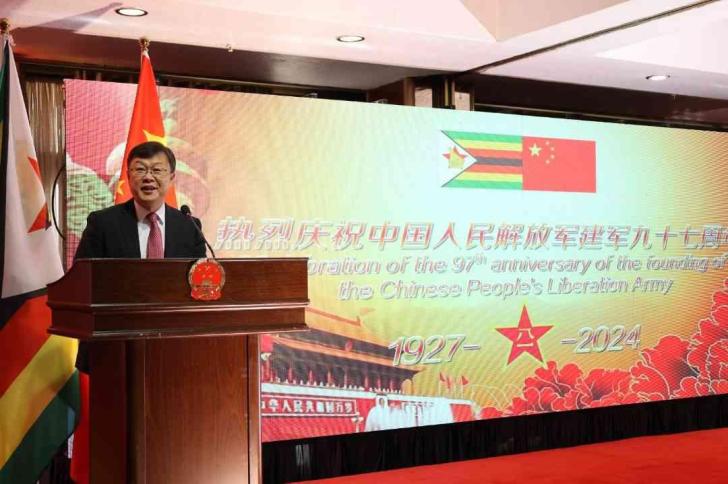News / National
China donates US$16 million in food aid to Zimbabwe
6 hrs ago | Views

Zimbabwe received US$16 million in emergency food assistance from China in 2023 to cushion vulnerable communities from the impact of the El Niño-induced drought, Chinese Ambassador Zhou Ding revealed on Friday.
Speaking during the commissioning of the China-Zimbabwe Agricultural Co-operation Demonstration Village in Zindi village, Shamva District, Ambassador Zhou said the intervention supported Zimbabwe's Food Deficit Mitigation Programme and helped ease the suffering of drought-affected households.
"This assistance significantly alleviated the hardships faced by many communities during a challenging period," Zhou said.
The newly commissioned demonstration village is equipped with vital infrastructure, including solar-powered boreholes and water points, designed to ensure efficient irrigation and consistent water supply for residents.
Highlighting the broader significance of the initiative, Zhou said it draws inspiration from China's own remarkable transformation and poverty reduction successes.
"Over the past four decades, China has lifted 800 million people out of poverty - more than 70% of the global poverty reduction figure. We believe Zimbabwe, with more than 60% of its population in rural areas, must prioritise rural development to unlock the country's full potential," he said.
Zhou also introduced Juncao technology, a pioneering Chinese innovation capable of producing edible mushrooms, animal feed, and supporting ecological restoration - offering multi-faceted benefits to local farming communities.
The Zindi project, part of China's Global Development Initiative, is focused on strengthening collaboration in food security, climate resilience, and rural economic empowerment. It has already yielded promising results, with local maize farmers achieving an average of five tonnes per hectare.
To further bolster the initiative, the Chinese government has pledged an additional US$100,000 worth of agricultural equipment. This includes hatching machines, incubators, solar panels, and other tools to boost productivity and modernise farming practices.
Zimbabwe's Deputy Minister of Agriculture, Vangelis Haritatos, welcomed the development, saying it supports the government's rural industrialisation vision.
"We must replicate this model across the country through our Village Business Units. The goal is to reverse urban migration by creating vibrant rural economies that add value to agricultural produce and generate employment," Haritatos said.
The project is expected to serve as a blueprint for rural transformation, providing a sustainable path toward food security and economic resilience for marginalised communities.
Speaking during the commissioning of the China-Zimbabwe Agricultural Co-operation Demonstration Village in Zindi village, Shamva District, Ambassador Zhou said the intervention supported Zimbabwe's Food Deficit Mitigation Programme and helped ease the suffering of drought-affected households.
"This assistance significantly alleviated the hardships faced by many communities during a challenging period," Zhou said.
The newly commissioned demonstration village is equipped with vital infrastructure, including solar-powered boreholes and water points, designed to ensure efficient irrigation and consistent water supply for residents.
Highlighting the broader significance of the initiative, Zhou said it draws inspiration from China's own remarkable transformation and poverty reduction successes.
"Over the past four decades, China has lifted 800 million people out of poverty - more than 70% of the global poverty reduction figure. We believe Zimbabwe, with more than 60% of its population in rural areas, must prioritise rural development to unlock the country's full potential," he said.
Zhou also introduced Juncao technology, a pioneering Chinese innovation capable of producing edible mushrooms, animal feed, and supporting ecological restoration - offering multi-faceted benefits to local farming communities.
The Zindi project, part of China's Global Development Initiative, is focused on strengthening collaboration in food security, climate resilience, and rural economic empowerment. It has already yielded promising results, with local maize farmers achieving an average of five tonnes per hectare.
To further bolster the initiative, the Chinese government has pledged an additional US$100,000 worth of agricultural equipment. This includes hatching machines, incubators, solar panels, and other tools to boost productivity and modernise farming practices.
Zimbabwe's Deputy Minister of Agriculture, Vangelis Haritatos, welcomed the development, saying it supports the government's rural industrialisation vision.
"We must replicate this model across the country through our Village Business Units. The goal is to reverse urban migration by creating vibrant rural economies that add value to agricultural produce and generate employment," Haritatos said.
The project is expected to serve as a blueprint for rural transformation, providing a sustainable path toward food security and economic resilience for marginalised communities.
Source - newsday











































